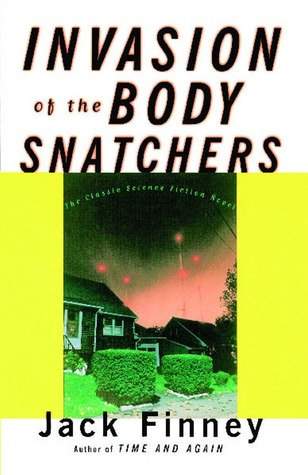
|
|
Invasion of the Body Snatchers
by Jack Finney
Reading Review by Michael Channing
Last year nearly all of my reading reviews were positive, with a few objections thrown into otherwise complimentary reviews. But disliking books you read is part of being a reader, so this year I felt compelled to take the good with the bad. My last few reviews have been troublesome, haven’t they? It seems I’ve saved my most troublesome for last. There are aspects of this book I really like, but the parts I hate I seriously hate. Where to start? Let’s begin with the neutral to negative stuff and end on a positive measure.
More likely than not, you know the premise of this book. Alien pod-people replace humans, taking their forms and pretending to be them. The invasion is a quiet one, and those who suspect something is amiss are explained away as paranoid or crazy. Think about it, a person goes to their doc and says, “My aunt isn’t really my aunt. She’s different in some way I can’t describe. I think she might be an impostor.” There’s an actual psychiatric disorder that diagnoses this very feeling, Capgras delusion. So the invasion continues, person after person being replaced while those who catch on are written off and ignored. And here is my first problem with the book. The characters keep labeling themselves as crazy. The narrator does it several times, even after discovering multiple “blank” bodies hidden in multiple houses and actually eavesdropping on a cabal of aliens planning the takeover of the town. He constantly convinces himself that he must be crazy, that all the impossible things he sees are mere illusions. The first time this happened, I accepted it as a character trait and a way for the author to prolong the story. But after being physically attacked by beings who look just like his friends, he attempts to explain it as himself being nutty. I was furious. There’s no damn way anyone going through this chain of events would come to any conclusion other than, “Aliens are among us.” It’s a case of bad writing.
Another bothersome aspect can probably be explained as a product of the times in which the book was written, the early 1950s. The narrator, a small-town doctor, has the hots for the woman who first comes into his office and complains that her dad isn’t really her dad. I guess stories of that era just had to have a love interest, and science fiction protagonists had to save some helpless female from the otherworldly threat. But the way the doc fawns and drools over the woman is embarrassing. During the first ten or so chapters, I took to calling the book Invasion of the Cock Blockers. He was more concerned with how the aliens would ruin his chances with her than with what to do about giant pods and featureless bodies that kept turning up all over town. I can say I was pleasantly surprised when the woman contributed ably to the final escape plan and proved herself a smart and handy hero. But the doc’s endless frustration at not getting into her pants made me cringe.
Then there’s the ending. It’s just terrible. The first movie to adapt this book changed the ending and got it perfect. The book’s final passages are laughable. After finally redeeming itself and treating us to to some heavy dialog and heady philosophy, after turning the trope of the damsel in distress on its ear, after allowing the protagonists to honorably overcome an inescapable situation with skill and intelligence, the book abandons all logic and credibility. It’s a wretched conclusion to what was shaping up to be a pretty good story.
There are several passages that speak of how the town changed over time, how the mutations were out in plain view but happening so slowly as be unnoticeable until they became part of the landscape. It’s a frightening revelation, one we are waking up to in our reality right now. Where did all the nazis and white nationalists come from? Were they always there, shopping along beside me with me at Food Lion, working next to me at the office, sending their kids to the same school as mine? The seeds took root in darkness, and while I wasn't paying attention, the world became something different.
This concept was made into several movies, only one of which I have seen in its entirety, the original, filmed in 1956. It was a good film, and it cast the invaders as a stand-in for communism, surreptitiously corrupting our country from the inside. In the book, the threat is a blank slate for whatever we fear, whatever enemy or idea we feel is slowly changing our way of life. This part is brilliant. It’s why the book has survived for so long despite its horrible conclusion. No matter who you are, what you do, or what you believe, you'll always have a buried thought that you're missing out on something. That others are having fun without you, keeping you out of their circles, conspiring in the shadows, circulating secrets you don't get to share. Of course, those others are thinking the same things about you. So we all gather into our safe cliques, certain ours is the true and correct way of life. One day, when we venture out of our communities, we'll be shocked to find the world is full of wrong-minded people. Some of us will inevitably say, “This will all have to go.”
Invasion of the Body Snatchers is a flawed book, but at its core is a truth so deep even its most egregious faults cannot ruin it. I recommend reading it so you’ll have it in your head and so also, when a new movie version hits and tons of think pieces spill out of overly-verbose blowhards like me, you’ll be able to say you saw it coming.

More Reading Reviews
|
|

|

|

|

|

|
Novel November |
Rendezvous
|
The Voyage of
|
Bluebeard
|
The Invisible Man
|
Norse Mythology
|


